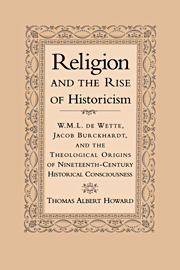 Religion and the Rise of Historicism
Religion and the Rise of Historicism Book contents
- Frontmatter
- Contents
- Acknowledgments
- Introduction: History, Theology, and Modernity
- 1 W. M. L. de Wette: Enlightenment, Romanticism, and Biblical Criticism
- 2 De Wette and Schleiermacher at Berlin (1810–1819): Politics, History, and the Post-Enlightment Transformation of Theology
- 3 De Wette, D. F. Strauss, and the New Christusbild
- 4 Basel, Burckhardt, and de Wette
- 5 History without Centaurs
- Abbreviations: Used in Notes and Bibliography
- Notes
- Bibliography
- Index
4 - Basel, Burckhardt, and de Wette
Published online by Cambridge University Press: 02 December 2009
- Frontmatter
- Contents
- Acknowledgments
- Introduction: History, Theology, and Modernity
- 1 W. M. L. de Wette: Enlightenment, Romanticism, and Biblical Criticism
- 2 De Wette and Schleiermacher at Berlin (1810–1819): Politics, History, and the Post-Enlightment Transformation of Theology
- 3 De Wette, D. F. Strauss, and the New Christusbild
- 4 Basel, Burckhardt, and de Wette
- 5 History without Centaurs
- Abbreviations: Used in Notes and Bibliography
- Notes
- Bibliography
- Index
Summary
Once upon a time I studied theology … with the greatest interest, and then found I did not have the faith required for the pulpit, and thereupon transferred over to history.
– Burckhardt, Letter to Friedrich von Preen, 7 July 1878As a theology student at the University of Basel (1837–9), Jacob Burckhardt encountered the thought of de Wette. Burckhardt embraced wholeheartedly de Wette's esprit critique, but soon came to question his reconstruction of Christian belief. Deeming it unintelligible on many points, Burckhardt vowed to be an “honest heretic” (ehrlicher Ketzer), instead. Indeed, the encounter with de Wette unsettled the young Burckhardt to such an extent that he experienced an intellectual and emotional “crisis” (his word) of faith, gave up theology altogether, and resolved to pursue historical studies at the University of Berlin. Significantly, his decision against theology was made at about the time that his father (Jakob Burckhardt, Sr.) was elected Antistes, the highest ecclesiastical office in Basel, at the city cathedral. That this formative theological experience has received scant attention from Burckhardt scholars is at first glance curious.
The omission can be partly explained, however, by three historical factors. First, Burckhardt's importance as a historical thinker was recognized belatedly, long after de Wette and his early nineteenth-century concerns had been driven from the theological limelight by bigger names – Schleiermacher, Strauss, and Julius Wellhausen in particular. Second, when the importance of Burckhardt's thought was recognized, it was done so at a time when the political events of the twentieth century and an inquiry into their origins so overshadowed other concerns that Burckhardt became interesting primarily for his Kulturgeschichte and its implicit contempt for state power as a healthy alternative to the state-aggrandizing orientation of Prussian historiography.
- Type
- Chapter
- Information
- Religion and the Rise of HistoricismW. M. L. de Wette, Jacob Burckhardt, and the Theological Origins of Nineteenth-Century Historical Consciousness, pp. 110 - 136Publisher: Cambridge University PressPrint publication year: 1999


